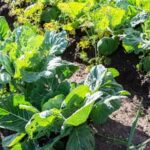Are you looking for safe and effective ways to protect your vegetable garden from pests? Look no further than organic pesticides for vegetable gardens.
Organic pesticides are a natural and environmentally friendly alternative to synthetic chemicals, ensuring the health of both your plants and the ecosystem. In this article, we will explore the importance of organic pesticides in vegetable gardens, the types of natural options available, the benefits they offer, DIY recipes for making your own organic pesticide at home, best practices for application, and more.
As vegetable gardeners, it is essential to understand the significance of using organic pesticides for pest control. Not only do these natural alternatives effectively manage pests, but they also contribute to a sustainable and eco-friendly gardening environment. Organic pesticides provide a safer way to protect your vegetables from harmful insects without introducing harmful chemicals into the soil and water supply.
In this comprehensive guide, we will delve into the various types of organic pesticides available for vegetable gardens, their benefits over synthetic pesticides, common pests that affect vegetable plants, and how to create your own organic pesticide at home. Whether you are new to organic gardening or looking to enhance your knowledge on sustainable pest management methods, this article will equip you with valuable insights into using organic pesticides effectively in your vegetable garden.
Types of Organic Pesticides
Organic pesticides for vegetable gardens are an essential part of sustainable and eco-friendly gardening practices. When it comes to pest control in your vegetable garden, there are various natural options available that can effectively keep your plants safe from harmful insects while also preserving the overall health of the environment.
One type of organic pesticide commonly used in vegetable gardens is insecticidal soap, which is made from potassium salts of fatty acids. This type of pesticide targets soft-bodied pests such as aphids, spider mites, and whiteflies, effectively killing them on contact without leaving harmful residues on the plants.
Another natural option is neem oil, derived from the seeds of the neem tree. Neem oil works as a broad-spectrum insecticide and fungicide, providing protection against a wide range of pests and diseases in vegetable gardens.
Furthermore, diatomaceous earth is a popular choice for organic pest control in vegetable gardens. This natural substance is made from the fossilized remains of diatoms and acts as an abrasive powder that damages the exoskeletons of insects, causing dehydration and ultimately leading to their demise. These are just a few examples of the many types of organic pesticides available for use in vegetable gardens, each offering a non-toxic and environmentally friendly solution to pest problems.
| Organic Pesticide Type | Main Function |
|---|---|
| Insecticidal soap | Kills soft-bodied pests on contact without leaving harmful residues |
| Neem oil | Works as an insecticide and fungicide for broad-spectrum pest and disease control |
| Diatomaceous earth | Abrasive powder that damages insects’ exoskeletons, leading to dehydration and death |
Benefits of Using Organic Pesticides
When it comes to pest control in vegetable gardens, using organic pesticides has numerous benefits for both the plants and the environment. These natural options not only effectively manage pests but also support the overall health of the garden ecosystem. Here are some key reasons why using organic pesticides is beneficial:
1. Environmental safety: Organic pesticides are derived from natural sources such as plants, minerals, and beneficial insects, making them safer for the environment compared to synthetic chemicals. They do not leave behind harmful residues that can contaminate soil, water, or harm non-target organisms like bees and other beneficial insects.
2. Healthier plants: Organic pesticides work in harmony with the natural processes of the plant, supporting its immune system and overall health. By using these natural options for pest control, vegetable gardeners can ensure that their plants remain free from pests while maintaining their nutritional value and flavor.
3. Reduced chemical exposure: By choosing organic pesticides for vegetable gardens, gardeners can minimize their exposure to potentially harmful chemicals. This is especially important for those who consume homegrown produce, as it ensures that they are not ingesting synthetic pesticide residues.
Utilizing organic pesticides for vegetable gardens aligns with sustainable gardening practices and promotes a balanced approach to pest management. By understanding the benefits of these natural options, gardeners can make informed choices that contribute to a healthier garden ecosystem and a safer environment.
How to Make Your Own Organic Pesticide at Home
Organic pesticides are a crucial component of maintaining a thriving and healthy vegetable garden. Not only are they effective at controlling pests, but they also contribute to the overall health of the environment and the safety of the produce. Making your own organic pesticide at home is not only cost-effective but also ensures that you have full control over the ingredients used. Here are some DIY recipes for safe and effective pest management using natural ingredients:
- Neem Oil Spray: Mix neem oil with water and a small amount of dish soap to create a solution that is effective against aphids, mealybugs, and other soft-bodied insects.
- Garlic and Chili Pepper Spray: Blend garlic cloves, chili peppers, and water together, then strain the mixture to create a repellent spray for caterpillars, beetles, and aphids.
- Oil and Soap Spray: Combine vegetable oil, liquid soap, and water to create a pesticide that suffocates pests like mites, scales, and whiteflies on contact.
These DIY organic pesticide recipes provide an alternative to chemical-based products while effectively managing pest populations in your vegetable garden. By using natural ingredients that are readily available in most kitchens or garden sheds, you can ensure that your plants remain healthy without compromising environmental safety.
In addition to these homemade remedies, it’s important to remember that proper application is key to successful pest management. Always test a small area of your plants before applying any new spray to ensure there are no adverse effects.
It’s also essential to apply organic pesticides in the early morning or late afternoon when beneficial insects are less active and avoid spraying during windy conditions to prevent drift. By following best practices for using organic pesticides in your vegetable garden, you can safeguard both your plants and the ecosystem as a whole while effectively controlling pests.
Best Practices for Using Organic Pesticides in Your Vegetable Garden
Proper Application
When using organic pesticides for vegetable gardens, it is important to apply them properly to ensure their effectiveness. One key aspect of proper application is timing. It is best to apply organic pesticides early in the morning or late in the afternoon when beneficial insects are less active. Additionally, make sure to follow the instructions on the product label and avoid applying pesticides during windy conditions to prevent drift.
Safe Handling and Storage
Safety should be a top priority when using any type of pesticide, including organic ones. Always wear protective clothing, such as gloves and a mask, when mixing or applying organic pesticides. After use, store these products in a secure location away from children and pets to prevent accidental ingestion or exposure.
Integrated Pest Management
Incorporating integrated pest management (IPM) practices can complement the use of organic pesticides in vegetable gardens. This approach focuses on preventive measures, monitoring pest populations, and using biological controls whenever possible before resorting to pesticide application. By combining organic pesticides with IPM strategies, gardeners can minimize the risks associated with pest control and promote a healthier garden ecosystem.
By following these best practices for using organic pesticides in your vegetable garden, you can effectively manage pests while minimizing harm to the environment and non-target organisms. Taking a careful approach to pesticide application and safety can lead to a thriving garden that is both productive and sustainable.
Common Pests in Vegetable Gardens and the Best Organic Pesticides to Use Against Them
Vegetable gardens are often faced with a variety of pests that can cause damage to crops if left unchecked. Some common pests include aphids, caterpillars, beetles, and mites. Fortunately, there are several effective organic pesticides that can help manage these pesky invaders without the use of harmful chemicals.
One popular organic pesticide for vegetable gardens is neem oil, which is derived from the seeds of the neem tree. Neem oil is effective against a wide range of pests, including aphids, mites, and caterpillars. It works by disrupting the insects’ feeding and reproductive systems, ultimately leading to their demise. Additionally, neem oil is safe to use around beneficial insects and won’t harm the environment.
Another natural option for pest control is pyrethrin, which is derived from chrysanthemum flowers. Pyrethrin works by targeting the nervous systems of insects upon contact, making it an effective solution for controlling beetles, aphids, and other garden pests. It breaks down quickly in the environment and has a low toxicity to mammals, making it a safer alternative to synthetic pesticides.
A third organic pesticide worth considering is diatomaceous earth (DE), a fine powder made from fossilized algae. When applied to plants, DE punctures the exoskeletons of insects like slugs and snails, causing dehydration and eventual death. DE is non-toxic to humans and pets but should be used sparingly in areas where beneficial insects frequent.
| Organic Pesticide | Target Pests |
|---|---|
| Neem Oil | Aphids, Mites, Caterpillars |
| Pyrethrin | Beetles, Aphids |
| Diatomaceous Earth (DE) | Slugs, Snails |
(Caution: Please note that while these organic pesticides are safer than synthetic alternatives for humans and pets when used properly, they should still be handled with care. Always follow the instructions on the product label and avoid using them during windy conditions to prevent unintended exposure).
Organic Pesticides vs Synthetic Pesticides
When it comes to pest control in vegetable gardens, the choice between organic pesticides and synthetic pesticides is an important one. Understanding the differences between these two options can help gardeners make informed decisions about how to protect their plants. In this section, we will explore the key distinctions between organic and synthetic pesticides and why choosing organic is the better choice for sustainable vegetable gardening.
Understanding Organic Pesticides
Organic pesticides are derived from natural sources such as plants, minerals, or beneficial insects. These products are designed to target specific pests while minimizing harm to non-target organisms and the environment. Examples of organic pesticides include neem oil, diatomaceous earth, and insecticidal soaps. These products work by disrupting pests’ life cycles, repelling them, or causing physical harm.
The Difference Between Organic and Synthetic Pesticides
Synthetic pesticides, on the other hand, are chemical-based products that are often more potent than their organic counterparts. While they may effectively control pests in the short term, synthetic pesticides can have long-lasting negative effects on soil health, water quality, and beneficial insects. Additionally, overuse of synthetic pesticides can lead to pesticide resistance in pests, making them less effective over time.
Why Organic Is the Better Choice
Choosing organic pesticides over synthetic ones is essential for several reasons. Organic options are generally safer for humans and wildlife, as they break down more quickly in the environment and pose fewer risks of toxicity. By utilizing natural substances for pest control, gardeners can also contribute to a healthier ecosystem overall.
Furthermore, using organic pesticides aligns with sustainable gardening practices that prioritize long-term environmental health and resilience. Overall, understanding the difference between organic and synthetic pesticides highlights the many benefits of choosing organic options for managing pests in vegetable gardens.
Conclusion
In conclusion, the use of organic pesticides for vegetable gardens is not only important for the health and well-being of the plants, but also for the overall sustainability of our environment. As we continue to prioritize eco-friendly practices in agriculture, the future of organic pesticides looks promising. By opting for natural solutions over synthetic chemicals, gardeners can effectively manage pests while minimizing harm to beneficial insects and wildlife.
The benefits of using organic pesticides are evident in their ability to protect vegetables from pests without leaving harmful residues. Additionally, the use of natural options contributes to healthier soil and ecosystems. With a variety of DIY recipes available for making organic pesticides at home, it’s clear that there are accessible alternatives to synthetic products.
As we strive towards more sustainable vegetable gardening practices, it is essential to consider the impact of our pest control methods on both the immediate environment and long-term ecological balance. Choosing organic pesticides for vegetable gardens aligns with these environmental goals and ensures that future generations can continue to enjoy the benefits of safe and healthy produce. Organic pesticides offer a viable solution for effective pest management without compromising the well-being of our ecosystem.
Frequently Asked Questions
What Is a Safe Pesticide for Vegetable Garden?
Finding a safe pesticide for your vegetable garden can be tricky, but there are some options. One popular choice is neem oil, which is derived from the seeds of the neem tree and is effective against a variety of pests without harming beneficial insects or pollinators.
How Do I Make Organic Pest Control for My Vegetable Garden?
Making your own organic pest control for your vegetable garden can be simple and effective. You can create a homemade spray using ingredients like garlic, onion, chili peppers, and dish soap mixed with water. This natural solution can help repel pests from your plants without introducing harmful chemicals into your garden.
What Is the Best Organic Pesticide for Tomatoes?
When it comes to tomatoes, one of the best organic pesticides is bacillus thuringiensis (Bt). This naturally occurring bacteria targets caterpillars, tomato hornworms, and other harmful insects that commonly affect tomato plants. Bt is considered safe for humans, animals, and beneficial insects while effectively controlling pests in the garden.

If you’re looking to get into vegetable gardening, or are just looking for some tips on how to make your current garden better, then you’ve come to the right place! My name is Ethel and I have been gardening for years. In this blog, I’m going to share with you some of my best tips on how to create a successful vegetable garden.





